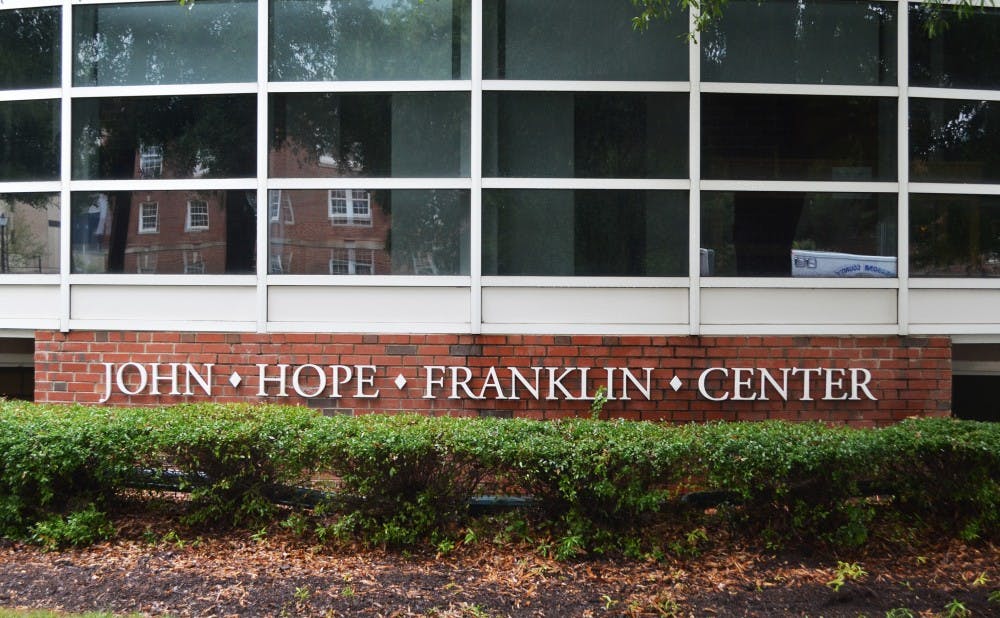Duke’s Global Justice and Equity fellows organized a conference Nov. 3 on advancing community-engaged research against the backdrop of Duke and the surrounding Durham community Friday.
The Graduate Fellowship for Global Justice and Equity supports Duke doctoral students conducting research in international or regional studies, who are making an “important contribution to advancing understanding of racial, social and equitable justice.”
“To have the opportunity to get together with different people who have different understandings of [equity and justice], and to be able to pick their brain and engage with their work and they engage with my work has been excellent in terms of just making my work even better,” said Miguel Martinez, a GJE fellow and doctoral student in the department of political science.
The inaugural cohort of GJE fellows moderated panels on multidisciplinary understandings of equity and justice and best practices for community-based research. The third and final panel provided a case study example of a collaborative approach to addressing food insecurity in Durham’s Hispanic and Latino communities.
The final panel brought four guests into the conversation: Scott Brummel, the program manager for the fresh produce program at Root Causes, Elaijah Lapay, a senior at Duke involved in Root Causes, Saskia Cornes, program director of the Duke Campus Farm and Rubi Morales, community health department manager at El Centro Hispano in Durham.
“I think they did a really stunning job getting multiple perspectives in the room,” one panel attendee said. “A lot of smart people, a lot of community partners, people from the Durham community, talking about how those collaborations actually come into being.”
Brummel explained the origins of Root Causes, which started as a Duke medical school student organization founded by students who were “really forward-thinking in wanting to include social determinants of health and non-biological aspects of people's health care into their education and practice as young physicians.”
Brummel said that Root Causes transitioned from a clinic-based model to a distribution model during the COVID-19 pandemic.
“What a family experiences as a part of our program is an ongoing relationship with our organization. We’re constantly calling them at least once a month and providing food deliveries to their home every other week, and we currently have a participant pool of 400 families that we're actively serving,” he said.
With the support of community volunteering and partnerships, the Root Causes Fresh Produce Program has operated for 187 weeks in a row and the Campus Farm donates about a quarter of what it grows directly to Root Causes, according to Cornes.
Root Causes and El Centro Hispano connected during the pandemic, during which Durham County brought together organizations and researchers interested in combatting food insecurity to learn how they could “better understand the needs of our community and then address those.”
“Something that I'm always looking [for] when someone comes with a proposal or whatever program that they want to [found], it's what benefits it’s going to bring to my community, what benefits are going to end up after the program ends,” Morales said about El Centro Hispano.
Both Brummel and Lapay from Root Causes and Morales discussed how the partnership between the two organizations could be advanced beyond funding.
“I think we need to make a commitment to continue to ask, ‘How can we be helping you guys and supporting you?’ and not always when there's funding attached to it,” Brummel said.
Morales admitted to struggles throughout their collaboration on a research study, having to mediate conversations between her supervisor and the Root Causes leadership on the project.
Lapay raised challenges due to the organization’s student-run nature.
“How do we keep ourselves accountable, and how do we keep the partnership accountable to each other?” he asked. “How do we manage the summer? How do we manage the breaks? How do we manage what happens when students aren't here, but El Centro wants support for a holiday event, for example?”
Similar questions about implementing community-based research were posed earlier in the day in the second panel of the conference around best practices, while the first panel discussed equity and justice as multidisciplinary principles.
“There is no one functional definition of equity and justice that you can apply to any given community or any given problem,” said Robin Fail, one of the moderators of the first panel, a GJE fellow and a doctoral student in earth and climate sciences.
“It was really interesting to hear about the overlaps between the arts and the sciences and how people are thinking about what liberation means, what abolition means, what it is, as a researcher, to take this work personally and take a moral standing in it. We don't just get to be objective scientists or researchers from above,” she added.
Get The Chronicle straight to your inbox
Sign up for our weekly newsletter. Cancel at any time.
Sophie Endrud is a Trinity first-year and a staff reporter for the news department.

